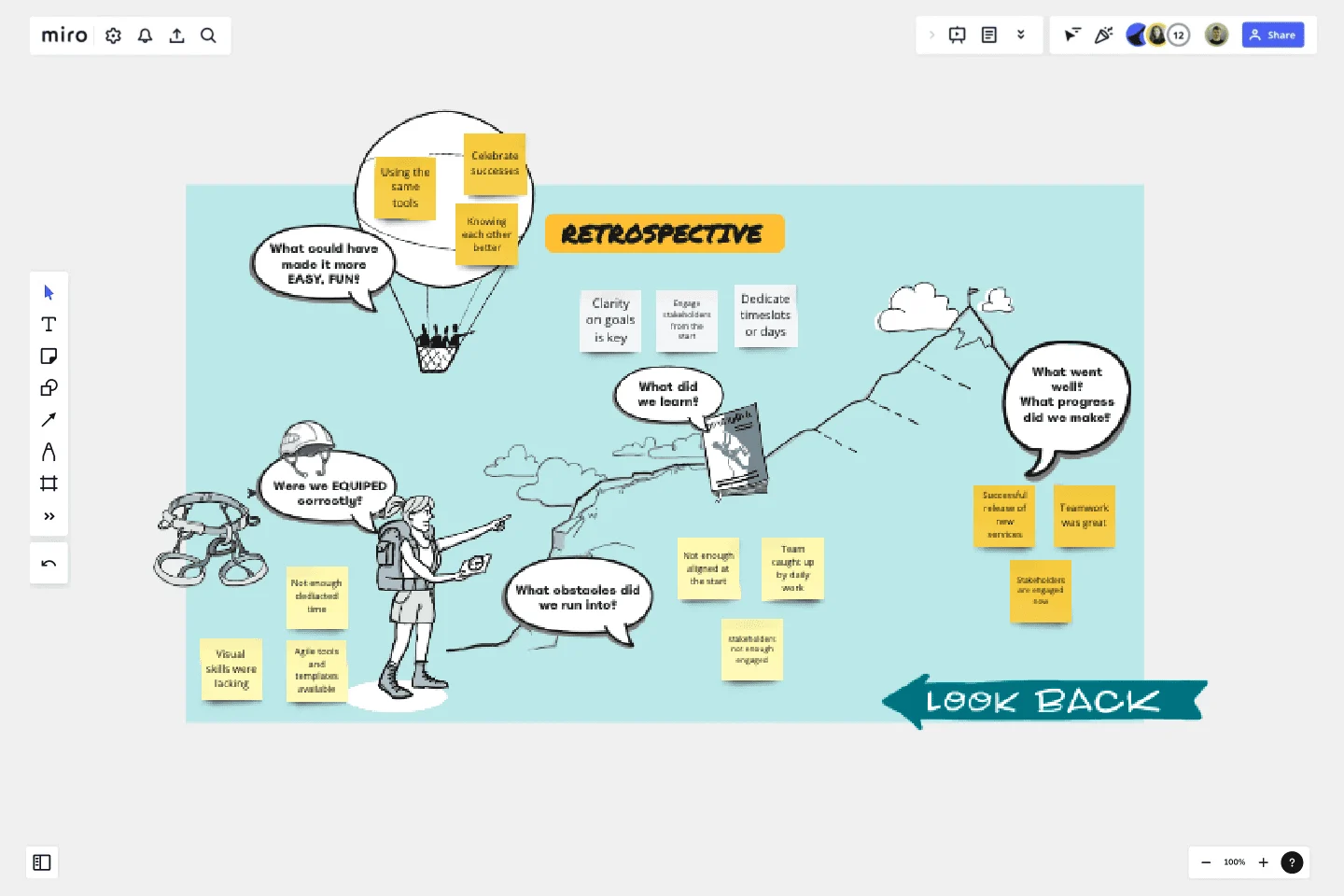Retrospective by Axelle Vanquaillie
Retrospective means looking back. This retrospective template helps teams to reflect on what worked well, what didn't work well, and what they learned. In this template, we added a few other aspects, more specifically, the equipment, the atmosphere, etc...
The value of a retrospective lies in the initiatives and actions that follow the reflection and improve the team's performance sustainably.
5 tips for running a retrospective meeting:
1. Install a safe environment. Like with every team reflection exercise, ensuring a climate of psychological safety is crucial. Make sure everyone is and feels involved. Focus on learning and not on blaming. And agree on the confidentiality of the meeting: what happens there stays there.
2. Organize individual reflection and allow people to talk in pairs first before sharing with the larger group. Discuss the pain points, learnings, achievements, etc... theme per theme, and make sure every voice has been heard.
3. Start with the aspects that went well. Starting strong brings positive energy and helps you through the harder nuts to crack.
4. Help the team switch from problems to solutions by defining the learnings immediately after framing the obstacles.
5. Go from solution to action. Agree on which steps need to be taken and hold each other accountable. Make the actions and next steps feasible so you can celebrate successes.
This template was created by Axelle Vanquaillie.
Get started with this template right now.
Breakout Group Template
Works best for:
Education, Team Meetings, Workshops
Breakout groups provide an excellent opportunity for teammates to have candid conversations and connect on a more intimate level than is possible during a broader meeting. When you’re in a large group setting, it can be difficult for people to feel safe or comfortable speaking up. In a smaller group, participants can feel safer sharing their ideas. Since the group is more intimate, teams are empowered to participate rather than observe.
Learning Loop Retro Template
Works best for:
Retros, Agile
The Learning Loop Retro template is a powerful tool designed to help teams reflect on their projects by recognizing successes and identifying areas for improvement. This template is part of Miro's Intelligent templates, which streamline workflows and keep teams engaged by integrating AI, interactive tools, and seamless integrations. One key benefit of the Learning Loop Retro template is its ability to drive continuous improvement. By regularly reflecting on their work and identifying areas for enhancement, teams can consistently elevate their performance and achieve better outcomes.
Project Retrospective
Works best for:
Retrospectives, Agile Methodology
The Project Retrospective template offers a structured approach for teams to review project performance and identify areas for enhancement. It provides elements for reflecting on project goals, milestones, successes, and challenges. This template enables teams to evaluate project outcomes, learn from experiences, and implement process improvements. By promoting reflection and accountability, the Project Retrospective empowers teams to optimize project delivery and drive continuous improvement effectively.
4 L's Retrospective Template
Works best for:
Retrospectives, Decision Making
So you just completed a sprint. Teams busted their humps and emotions ran high. Now take a clear-eyed look back and grade the sprint honestly—what worked, what didn’t, and what can be improved. This approach (4Ls stand for liked, learned, lacked, and longed for) is an invaluable way to remove the emotion and look at the process critically. That’s how you can build trust, improve morale, and increase engagement—as well as make adjustments to be more productive and successful in the future.
Sailboat Template
Works best for:
Agile Methodology, Meetings, Retrospectives
The Sailboat Retrospective is a low-pressure way for teams to reflect on how they handled a project. By defining your risks (the rocks), delaying issues (anchors), helping teams (wind), and the goal (land), you’ll be able to work out what you’re doing well and what you need to improve on for the next sprint. Approaching team dynamics with a sailboat metaphor helps everyone describe where they want to go together by figuring out what slows them down and what helps them reach their future goals.
Plus Delta Template
Works best for:
Software Development, Meetings, Retrospectives
The Plus Delta template is a simple but powerful tool for collecting constructive criticism from a group. The format encourages you and your team to focus on what went well, what you should repeat in the future, and what you should aim to change. To complete a Plus Delta template, simply make note of things that are working and things you would like to improve. You can then file these elements into two separate columns. Use Plus Delta to showcase wins and learnings for your team, stakeholders, employees, and bosses.
